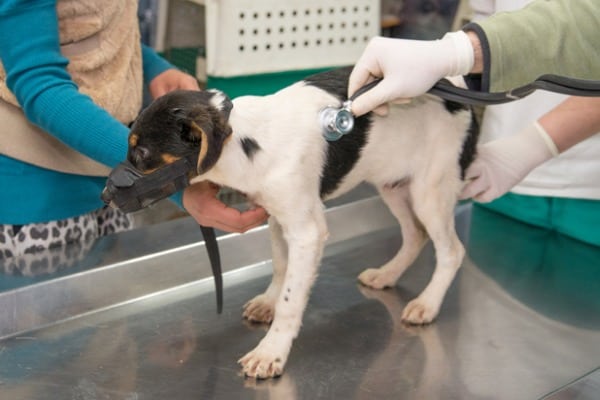Dealing with respiratory issues is a relatively common problem that many people experience.

Seeing that it’s common in people, would it be safe to say that respiratory issues are common in our beloved dog companions?
Well, the answer is yes, but it’s not something to be immediately worried about.
Every time you cough or sneeze, you don’t immediately think something is terribly wrong, do you?
Good, then you shouldn’t be worried to that extent at first sight of your dog coughing or sneezing.
Symptoms of respiratory issues shown by your dog should always be taken into consideration, but some problems it may be related to are much less severe than others.
This isn’t to say that there aren’t harmful respiratory diseases out there that could affect your dog.
Dogs that are at certain ages are especially more vulnerable, such as very young or very old.
In order to help you become more aware of respiratory symptoms and diseases to look for in your dog, we’ve compiled this list of the most common and easily noticeable symptoms and diseases.
Common Symptoms of Respiratory Problems

The more severe the disease/issue that your dog may be dealing with, the more severe these given symptoms will become.
Sometimes, your dog may just be dealing with a temporary sickness and will overcome their respiratory issues in a certain amount of time.
Regardless, if you notice any of these symptoms become persistent, give your veterinarian a call as soon as possible;
- Wheezing
- Coughing
- Blue Gums
- Lack Of Ability To Exercise / Lethargy
- Mild Fever
- Runny Eyes
- Nasal Congestion
- Sneezing
These varying symptoms can be related to different respiratory issues in your dog.
Whereas some may not be as severe or may just be temporary, it’s still worth it to get checked out by a professional.
Common Respiratory Diseases
There are a number of different respiratory diseases that have the potential to infect your dog, but some are much more common than others.

These include;
Chronic Obstructive Pulmonary Disease (COPD)
This disease is long-term, and will cause gradual degradation and inflammation in your dog’s pulmonary or respiratory system.
Otherwise known as Chronic Bronchitis, this disease is irreversible.
Canine Distemper Virus
When dogs are kept in one concentrated area for a prolonged period of time, this virus can become rapidly prevalent.
In addition to attacking the respiratory system, it also attacks the gastrointestinal system. This virus is treatable through a vaccine.
Kennel Cough
Most commonly forming in mid-late summer, kennel cough in dogs also becomes prevalent when multiple dogs are kept close to one another.
This disease is highly infectious but can be treated with antibiotics.
Cold / Flu
Just like humans, dogs can also contract the cold and the flu.
The symptoms can be analogous to human symptoms, but commonly, dogs do not need much extra care to get over the illnesses.
Severe symptoms may still occur, and this can be treated in a number of ways.
Pneumonia
If your dog contracts pneumonia, then they will experience inflammation in their lungs.
Dogs can contract pneumonia in various ways, including bacteria, lungworms, viruses, etc. Pneumonia can be treated with antibiotics.
Conclusion
There are a number of different symptoms to look out for when it comes to your dog’s respiratory health.
The good thing is that the symptoms listed above are easily identifiable, so if you notice any persistent symptoms, get in touch with your veterinarian right away!
The symptoms your dog is showing may not always be the result of a big problem, but it’s always worth it just to check it out.
